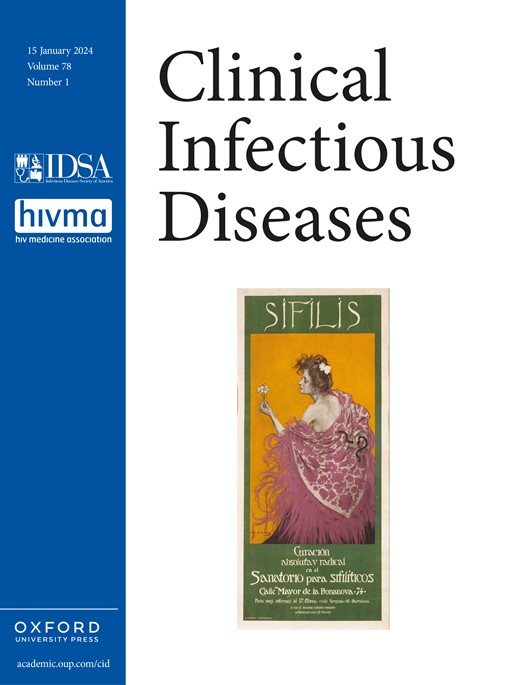2023年赤道几内亚实验室确认马尔堡病毒病患者病例系列
IF 8.2
1区 医学
Q1 IMMUNOLOGY
引用次数: 0
摘要
马尔堡病毒病(MVD)是由马尔堡马尔堡病毒引起的严重病毒感染。2023年2月,赤道几内亚宣布首次爆发疫情。本病例系列描述了5例实验室确诊的MVD患者的自然病史。方法对赤道几内亚巴塔国家治疗中心收治的MVD确诊患者进行生命体征和症状监测。收集全面的临床资料,以了解疾病的进展和结局。结果5例患者确诊为MVD。三名男性卫生保健工作者在疾病早期被诊断出来,随后存活下来。另外两名患者均为女性,在疾病进展较晚时入院,并在入院后24小时内死亡。4名患者根据未经注册和实验性干预措施的监测紧急使用方案接受了瑞德西韦治疗。早期症状是非特异性的,在疾病后期迅速发展为更严重的情况。早期用瑞德西韦治疗显示该药耐受性良好。结论:与一些报道和推荐的MVD病例定义相反,我们的患者表现为皮疹,但没有呕吐或腹泻。只有在死亡前的终末期才观察到出血迹象。尽管样本量有限,但这些发现强调了根据具体疫情调整病例定义的重要性。在未来的流行病应对过程中,应通过精心设计的试验收集有关MVD治疗方法(包括瑞德西韦)有效性和安全性的进一步证据。本文章由计算机程序翻译,如有差异,请以英文原文为准。
Case series of patients with laboratory confirmed Marburg virus disease, 2023 Equatorial Guinea
Background Marburg virus disease (MVD) is a severe viral infection caused by the Marburg marburgvirus species. In February 2023, Equatorial Guinea declared its first outbreak. This case series describes the natural history of MVD in five laboratory confirmed patients. Methods Patients with confirmed MVD admitted to the national treatment center in Bata, Equatorial Guinea, were monitored for vital signs and symptoms. Comprehensive clinical data was collected to understand the progression and outcome of the disease. Results Five patients were confirmed to have MVD. Three male healthcare workers were diagnosed early in their disease and subsequently survived. The other two patients, both females, were admitted later in their disease progression and died within 24 hours of admission. Four patients received remdesivir under a protocol for the Monitored Emergency Use of Unregistered and Experimental Interventions. The early symptoms were non-specific, with rapid progression to more severe conditions in the later stages of the disease. Early treatment with remdesivir showed the drug to be well tolerated. Conclusions Contrary to some reports and the recommended case definition for MVD, our patients presented with a rash but did not exhibit vomiting or diarrhea. Hemorrhagic signs were solely observed in the terminal stage, preceding demise. Despite the limited sample size, these findings emphasize the importance of tailoring the case definition to the specific outbreak. Further evidence on the efficacy and safety of therapeutics for MVD, including remdesivir, should be gathered through well-designed trials during future epidemic responses.
求助全文
通过发布文献求助,成功后即可免费获取论文全文。
去求助
来源期刊

Clinical Infectious Diseases
医学-传染病学
CiteScore
25.00
自引率
2.50%
发文量
900
审稿时长
3 months
期刊介绍:
Clinical Infectious Diseases (CID) is dedicated to publishing original research, reviews, guidelines, and perspectives with the potential to reshape clinical practice, providing clinicians with valuable insights for patient care. CID comprehensively addresses the clinical presentation, diagnosis, treatment, and prevention of a wide spectrum of infectious diseases. The journal places a high priority on the assessment of current and innovative treatments, microbiology, immunology, and policies, ensuring relevance to patient care in its commitment to advancing the field of infectious diseases.
 求助内容:
求助内容: 应助结果提醒方式:
应助结果提醒方式:


